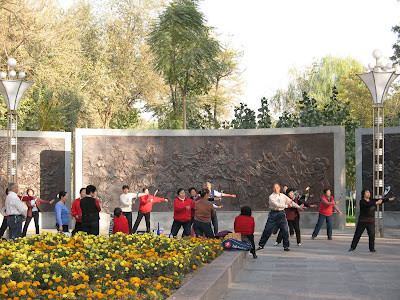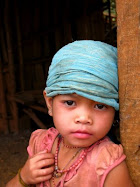
Meeting a Lama
Xiahe is home to the Labrang Monastery, one of the most important monastery towns in Tibetan Buddhism and a major pilgrimage place. Tim and I were doing the prayer wheel circuit alongside a couple who took their wallet out and presented it to the Buddha statues in each of the temples and who informed us that at 3:00 we could see the resident Lama, who is a reincarnation of a past Lama and now maybe 8-10 years old.
We showed up in the outer courtyard of his private apartments a little before three to find a small gathering of pilgrims dressed in there very finest, cleanest, and most colorful clothing and dripping with coral, turquoise, and silver jewelry. The couple who had told us to come here was getting their wallet out, ready to be blessed yet again. When the door opened to the inner courtyard the people rushed in and formed a single file line to offer the Lama money and white scarves, collected by a monk at the bottom of the steps. The Lama was seated on the porch, on a high, richly colored fabric draped table with a fuchsia cloaked monk on either side.
Tim and I pulled out about $1.40 each and slipped into the line with the other pilgrims. When the pilgrims approached the Lama, they bowed their heads and he whacked them on the top of the head with a yellow fabric wrapped bundle. When I reached the Lama he looked at me strangely, but recovered quickly and tapped my head with his bundle. I wonder if he has ever hit a honky on the head before! Tim was behind me, and got whacked hard. When everyone had payed his respects to and received blessings from the boy Lama, he then proceeded to carefully fold a paper airplane and fly it across the porch.
--------
I did not take any photos on the day Tim and I went to see the lama, but the following day I went back, slipped quietly into the shadow of the doorway, and snapped this shot.Click on it to enlarge and see the boy Lama better.

Pilgrims leaving the courtyard of the Lama. The women wear large silver and coral ornaments on their waists.

A pilgrim on the prayer wheel circuit. This circuit is 3 Km long, with over 1100 prayer wheels. I walked it each day, along side colorfully dressed pilgrims-some prostrating themselves around the entire thing-and fuchsia cloaked monks. All though many of the people walked the circuit with a focused, almost desperate, determination, some pilgrims would turn to give me the thumbs up sign (usually when I had the camera hidden!).









Some of the pilgrims and people of Xiahe
This beautiful Tibetan lady has huge silver and coral earrings.





A man getting his ears cleaned in the street

Collecting sage branches for the holy fires

A shopkeeper takes a snooze in the Muslim area

Boy eating a banana


Some of the monks from the monastery



The Yellow Hat sect is named for these distinctive hats the monks wear




The monk blowing into this long horn is hidden in the doorway

Tim and I overlooking the monastery from the top of the Golden Pagoda

Inside the Golden Pagoda


Another overview of the monastery and monks quarters from the hills beside the monastery


A closer shot of some of the golden roofs

Mao's Quote:
"We must undoubtedly criticise wrong ideas of every description. It certainly would not be right to refrain from criticism, look on while wrong ideas spread unchecked and allow them to monopolize the field. Mistakes must be criticised and poisonous weeds fought wherever they crop up."
"Quotations from Chairman Mao Tse-Tung" 1966, Foreign Languages Press.
Please note that Mao's quotes are presented for informational purposes only, and do not reflect the opinions of the blog author!































